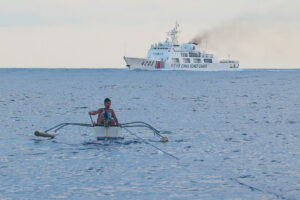POLITICAL and security analysts on Wednesday said the Philippines should devise new strategies in dealing with Chinese aggression in the South China Sea, warning that Beijing might soon impose a total blockade at Second Thomas Shoal.
“We should prepare for a long game, considering a scenario in which the Chinese government will no longer allow our troops for resupply missions to BRP Sierra Madre,” Gary Ador Dionisio, dean of De La Salle – College of Saint Benilde’s School of Diplomacy and Governance said in a Facebook Messenger chat.
He was referring to the rusting World War II-era ship that Manila grounded at the shoal in 1999 to assert its sovereignty.
“The [latest ramming] incident requires the Philippine government to review and recalibrate its actions to further resist the Chinese government’s aggression through diplomatic channels, while at the same time asking our allies to be more proactive,” he added.
The Philippines on Wednesday denounced what it called “illegal and aggressive” actions in the South China Sea after a Chinese vessel collided with a Philippine ship that led to a Filipino navy officer getting hurt.
The June 17 incident comes just weeks after Philippine President Ferdinand R. Marcos, Jr. warned that the killing of any Filipino in the waterway by a foreign aggressor would be “very close to an act of war.”
The United States has repeatedly stressed its “ironclad commitment” to a 1951 Mutual Defense Treaty with the Philippines that compels both sides to defend each other in case of an armed attack.
The treaty was updated last year to cover attacks on Philippine armed forces, vessels and other assets anywhere in the South China Sea.
“The time has come for Manila to request formal consultation with the US under Article III of the Mutual Defense Treaty,” Raymond M. Powell, a fellow at Stanford University’s Gordian Knot Center for National Security Innovation, said in an X message.
Under the treaty, the parties through their Foreign ministers or their deputies may consult together regarding the treaty’s implementation “whenever in the opinion of either of them the territorial integrity, political independence or security of either of the parties is threatened by an external armed attack in the Pacific.”
“Statements of support from the US and many of its allies have been strong, but China has grown calloused to international opprobrium,” Mr. Powell said.
He said the main issue is China’s repeated attempts to block resupply missions to the Philippine military outpost at Second Thomas Shoal.
“Manila should continuously have discussions with its allies and partners in terms of what they can do and what they cannot commit to ensure collective deterrence is intact,” said Joshua Bernard B. Espeña, vice president at Manila-based International Development and Security Cooperation.
“For now, they must provide the Philippines with what it needs amid a darker shade of China’s gray-zone strategy.”
The Philippines has gained strong international support after it launched a transparency campaign last year that seeks to expose Chinese aggression within the Philippines’ exclusive economic zone, such as the use of water cannons and dangerous maneuvers.
“While we should keep our diplomatic efforts across the globe to portray us as the aggrieved and just party, something should really be done to begin puncturing the Chinese presence,” said Hansley A. Juliano, who teaches political science at the Ateneo de Manila University.
He said the Philippines is unlikely to lobby for the activation of its defense treaty with the United States since it “would leave the country isolated from the region and feed Chinese propaganda.”
Mr. Dionisio said the defense treaty is unlikely to be invoked since “US hegemony is also in crisis at the global level, with the possible changing of the guards in November.”
“The Philippines cannot push the Americans into the realm of entrapment,” Mr. Espeña said. “Without careful diplomatic sophistication, Washington might get under pressure of abandonment.”
But he said the Mutual Defense Treaty might be enforced once China seizes control of BRP Sierra Madre, which would effectively change the status quo in the area.
“In international relations, treaty commitments are invoked as soon as the one who involves them understands the calculation that allies may indeed come.” — Kyle Aristophere T. Atienza





